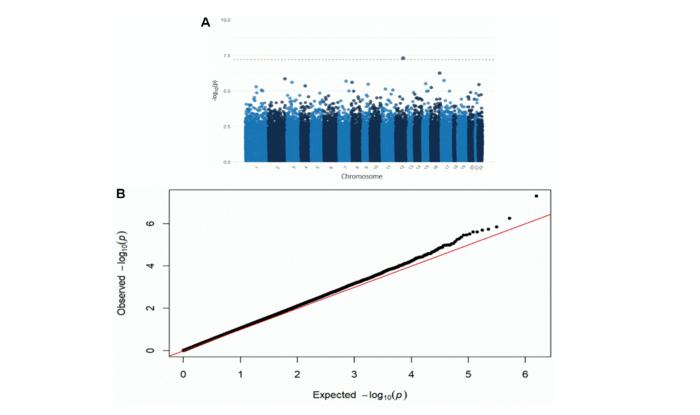“[…] our study identified one CpG site (cg26514961, PLXNC1 gene) that was significantly associated with neighborhood deprivation in brain tissue.”

Credit: 2024 Pett et al.
“[…] our study identified one CpG site (cg26514961, PLXNC1 gene) that was significantly associated with neighborhood deprivation in brain tissue.”
BUFFALO, NY- May 9, 2024 – A new research paper was published in Aging (listed by MEDLINE/PubMed as “Aging (Albany NY)” and “Aging-US” by Web of Science) Volume 16, Issue 8, entitled, “The association between neighborhood deprivation and DNA methylation in an autopsy cohort.”
Previous research has found that living in a disadvantaged neighborhood is associated with poor health outcomes. Living in disadvantaged neighborhoods may alter inflammation and immune response in the body, which could be reflected in epigenetic mechanisms such as DNA methylation (DNAm). In this new study, researchers Lindsay Pett, Zhenjiang Li, Sarina Abrishamcar, Kenyaita Hodge, Todd Everson, Grace Christensen, Marla Gearing, Michael S. Kobor, Chaini Konwar, Julia L. MacIsaac, Kristy Dever, Aliza P. Wingo, Allan Levey, James J. Lah, Thomas S. Wingo, and Anke Hüls from Emory University, University of British Columbia, BC Children’s Hospital Research Institute, Centre for Molecular Medicine and Therapeutics, and Atlanta VA Medical Center used robust linear regression models to conduct an epigenome-wide association study examining the association between neighborhood deprivation (Area Deprivation Index; ADI), and DNAm in brain tissue from 159 donors enrolled in the Emory Goizueta Alzheimer’s Disease Research Center (Georgia, USA).
“We found one CpG site (cg26514961, gene PLXNC1) significantly associated with ADI after controlling for covariates and multiple testing (p-value=5.0e-8).”
Effect modification by APOE ε4 was statistically significant for the top ten CpG sites from the EWAS of ADI, indicating that the observed associations between ADI and DNAm were mainly driven by donors who carried at least one APOE ε4 allele. Four of the top ten CpG sites showed a significant concordance between brain tissue and tissues that are easily accessible in living individuals (blood, buccal cells, saliva), including DNAm in cg26514961 (PLXNC1). This study identified one CpG site (cg26514961, PLXNC1 gene) that was significantly associated with neighborhood deprivation in brain tissue. PLXNC1 is related to immune response, which may be one biological pathway how neighborhood conditions affect health.
“The concordance between brain and other tissues for our top CpG sites could make them potential candidates for biomarkers in living individuals.”
Read the full paper: DOI: https://doi.org/10.18632/aging.205764
Corresponding Author: Anke Hüls
Corresponding Email: anke.huels@emory.edu
Keywords: DNA methylation, brain tissue, neighborhood deprivation, neuropathology, epigenetics
Click here to sign up for free Altmetric alerts about this article.
About Aging:
Aging publishes research papers in all fields of aging research including but not limited, aging from yeast to mammals, cellular senescence, age-related diseases such as cancer and Alzheimer’s diseases and their prevention and treatment, anti-aging strategies and drug development and especially the role of signal transduction pathways such as mTOR in aging and potential approaches to modulate these signaling pathways to extend lifespan. The journal aims to promote treatment of age-related diseases by slowing down aging, validation of anti-aging drugs by treating age-related diseases, prevention of cancer by inhibiting aging. Cancer and COVID-19 are age-related diseases.
Aging is indexed by PubMed/Medline (abbreviated as “Aging (Albany NY)”), PubMed Central, Web of Science: Science Citation Index Expanded (abbreviated as “Aging‐US” and listed in the Cell Biology and Geriatrics & Gerontology categories), Scopus (abbreviated as “Aging” and listed in the Cell Biology and Aging categories), Biological Abstracts, BIOSIS Previews, EMBASE, META (Chan Zuckerberg Initiative) (2018-2022), and Dimensions (Digital Science).
Please visit our website at www.Aging-US.com and connect with us:
- X, formerly Twitter
- YouTube
- Spotify, and available wherever you listen to podcasts
Click here to subscribe to Aging publication updates.
For media inquiries, please contact media@impactjournals.com.
Aging (Aging-US) Journal Office
6666 E. Quaker Str., Suite 1B
Orchard Park, NY 14127
Phone: 1-800-922-0957, option 1
###
Journal
Aging-US
Method of Research
Randomized controlled/clinical trial
Subject of Research
People
Article Title
The association between neighborhood deprivation and DNA methylation in an autopsy cohort
Article Publication Date
24-Apr-2024



